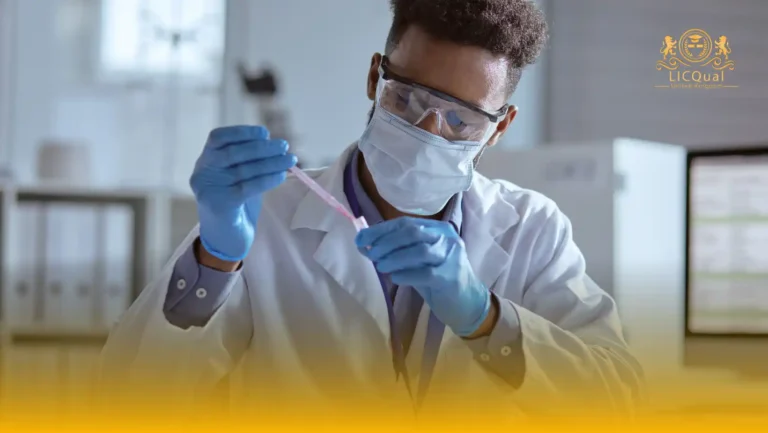The LICQual Level 6 Diploma in Geriatric Dentistry (Dip Geriatric Dentistry) is a specialised qualification designed for dental professionals seeking to advance their knowledge and expertise in the care of older patients. This diploma is not intended for fresh graduates but for experienced practitioners who wish to enhance their career prospects, expand their clinical skills, and demonstrate a strong commitment to Continuing Professional Development (CPD).
This comprehensive programme provides learners with in-depth knowledge of age-related oral health issues, geriatric assessment, and advanced treatment planning. Learners gain practical skills in managing complex dental conditions commonly encountered in older adults, including systemic disease interactions, medication-related oral effects, and functional and aesthetic considerations. The course covers preventative strategies, restorative procedures, prosthodontics, and multidisciplinary approaches to ensure holistic care for geriatric patients.
Centres delivering this qualification are required to meet rigorous standards to ensure high-quality training and learner success. They must employ competent and qualified staff with specialist expertise in geriatric dentistry and provide fully equipped clinical environments. Learners must have access to all necessary materials, tools, and up-to-date resources to support both theoretical understanding and practical skill development.
By completing this diploma, learners enhance their professional capabilities and credibility, equipping themselves to deliver advanced, patient-centred dental care to older adults. The qualification empowers learners to integrate evidence-based practices, manage complex clinical cases confidently, and maintain the highest standards of professionalism and care in geriatric dentistry.
Course Overview
Qualification Title
LICQual Level 6 Diploma in Geriatric Dentistry (Dip Geriatric Dentistry)
Total Units
6
Total Credits
120
GLH
480
Qualification #
LICQ2200684
Qualification Specification
To enroll in the LICQual Level 6 Diploma in Geriatric Dentistry (Dip Geriatric Dentistry) , applicants must meet the following criteria:
|
Qualification# |
Unit Title |
Credits |
GLH |
|---|---|---|---|
|
LICQ2200684-1 |
Principles of Geriatric Dentistry |
20 |
80 |
|
LICQ2200684-2 |
Oral Disease in Older Adults |
20 |
80 |
|
LICQ2200684-3 |
Preventive and Restorative Strategies |
20 |
80 |
|
LICQ2200684-4 |
Prosthodontics and Complex Treatment Planning |
20 |
80 |
|
LICQ2200684-5 |
Multidisciplinary Care and Patient Management |
20 |
80 |
|
LICQ2200684-6 |
Research, Evidence-Based Practice, and Professional Development |
20 |
80 |
By the end of this course, learners will be able to:
Unit 1: Principles of Geriatric Dentistry
- Demonstrate a comprehensive understanding of the physiological, anatomical, and psychosocial aspects of ageing.
- Analyse the impact of ageing on oral health and treatment planning.
- Evaluate assessment techniques for older patients, including risk factors and functional considerations.
- Apply theoretical knowledge to provide patient-centred geriatric dental care.
Unit 2: Oral Disease in Older Adults
- Demonstrate knowledge of common oral diseases affecting older adults, including caries, periodontal disease, oral cancers, and mucosal disorders.
- Analyse diagnostic approaches and management strategies for age-related oral conditions.
- Evaluate the impact of systemic health and medication on oral disease progression.
- Apply clinical skills to prevent, diagnose, and manage oral diseases in geriatric patients.
Unit 3: Preventive and Restorative Strategies
- Demonstrate advanced understanding of preventive dentistry tailored for older adults.
- Analyse restorative options and minimally invasive techniques suitable for geriatric patients.
- Evaluate strategies to maintain oral function, aesthetics, and quality of life.
- Apply preventive and restorative techniques effectively in clinical practice.
Unit 4: Prosthodontics and Complex Treatment Planning
- Demonstrate competence in managing dentures, implants, and complex restorative cases for older adults.
- Analyse occlusion, aesthetics, and functional requirements in treatment planning.
- Evaluate treatment sequencing and decision-making for complex geriatric cases.
- Apply prosthodontic principles to provide optimal clinical outcomes.
Unit 5: Multidisciplinary Care and Patient Management
- Demonstrate knowledge of multidisciplinary approaches to geriatric dental care.
- Analyse medical history, medication interactions, and ethical considerations in treatment planning.
- Evaluate communication strategies and patient-centred care techniques.
- Apply collaborative and ethical approaches to manage complex geriatric patients effectively.
Unit 6: Research, Evidence-Based Practice, and Professional Development
- Demonstrate understanding of research methodology and evidence-based practice in geriatric dentistry.
- Analyse and critically appraise scientific literature for clinical application.
- Evaluate reflective practice to support professional growth and Continuing Professional Development (CPD).
- Apply research findings and evidence-based strategies to enhance clinical and professional performance.
The LICQual Level 6 Diploma in Geriatric Dentistry (Dip Geriatric Dentistry) is designed for dental professionals, graduates, and healthcare practitioners who want to specialize in oral health care for older adults. This Geriatric Dentistry Level 6 diploma is ideal for those seeking to improve their clinical expertise, manage complex cases in elderly patients, and gain an internationally recognized qualification. Whether you are a practicing dentist, an academic, or an international professional, this accredited Geriatric Dentistry diploma provides the skills, flexibility, and credibility to advance your career.
1. Practicing dentists focusing on elderly care
- Dentists aiming to specialize in geriatric oral health and treatment
- Professionals who want to expand services for aging populations
- Those interested in earning a recognized Dip Geriatric Dentistry qualification
- Practitioners focusing on prosthodontics and restorative care for seniors
- Dentists looking to enhance patient trust through advanced geriatric expertise
2. Recent dental graduates
- Graduates who want to specialize early in Geriatric Dentistry
- Students seeking a postgraduate diploma to boost their career profile
- Young dentists aiming to stand out in a competitive dental job market
- Learners looking for flexible online Geriatric Dentistry courses
- Professionals aiming for international recognition in elderly care dentistry
3. International dental professionals
- Dentists from Pakistan, UK, Middle East, and other regions
- Professionals seeking a globally accredited Geriatric Dentistry diploma
- Those who prefer flexible online study options
- Practitioners aiming to meet international geriatric dentistry standards
- Dentists looking to expand career opportunities abroad
4. Dental specialists expanding skills
- Prosthodontists, orthodontists, and endodontists adding geriatric expertise
- Specialists aiming to broaden diagnostic and treatment capabilities
- Professionals seeking continuing professional development (CPD)
- Those who want to integrate geriatric dentistry into their practice
- Dentists pursuing multi‑disciplinary collaboration with healthcare teams
5. Academic and teaching professionals
- Dental educators seeking updated geriatric dentistry knowledge
- Academics aiming to strengthen teaching and research credentials
- Trainers who want to mentor future geriatric dental specialists
- Researchers looking for internationally recognized qualifications
- Educators seeking evidence‑based geriatric dentistry training
6. Healthcare professionals in elderly care
- Physicians and allied health staff interested in geriatric oral health
- Community health workers supporting elderly dental care programs
- Professionals collaborating with geriatric dentistry specialists
- Practitioners working in oral rehabilitation for older adults
- Those seeking interdisciplinary healthcare knowledge in geriatrics
7. Career‑focused dental practitioners
- Dentists aiming for career advancement in Geriatric Dentistry
- Professionals looking to increase recognition and credibility
- Practitioners seeking higher earning potential through specialization
- Dentists preparing for leadership roles in clinics and institutions
- Professionals committed to lifelong learning and excellence
- Qualified and Competent Staff
Employ experienced and appropriately qualified dental educators with specialist expertise in geriatric dentistry, restorative procedures, and patient management. - Clinical and Laboratory Facilities
Provide fully equipped clinical areas and laboratories that allow learners to safely practise geriatric assessments, restorative treatments, prosthodontics, and preventive care. - Access to Required Materials and Equipment
Ensure availability of all necessary dental instruments, restorative materials, protective gear, and learning resources to support practical training. - Teaching and Learning Resources
Provide access to up-to-date textbooks, journals, digital platforms, and research materials to support theoretical learning and evidence-based practice. - Compliance with Health and Safety Standards
Adhere to all relevant infection control, patient safety, and clinical governance regulations to maintain a professional and safe learning environment. - Assessment and Quality Assurance
Implement robust systems to monitor learner progress, conduct assessments, and maintain quality assurance in line with international standards. - Support for Learners’ Continuing Professional Development (CPD)
Encourage and facilitate CPD, enabling learners to apply advanced geriatric dentistry knowledge and skills effectively in clinical practice.
Assessment and Verification
All units within this qualification are subject to internal assessment by the approved centre and external verification by LICQual. The qualification follows a criterion-referenced assessment approach, ensuring that learners meet all specified learning outcomes.
To achieve a ‘Pass’ in any unit, learners must provide valid, sufficient, and authentic evidence demonstrating their attainment of all learning outcomes and compliance with the prescribed assessment criteria. The Assessor is responsible for evaluating the evidence and determining whether the learner has successfully met the required standards.
Assessors must maintain a clear and comprehensive audit trail, documenting the basis for their assessment decisions to ensure transparency, consistency, and compliance with quality assurance requirements.







